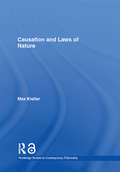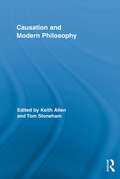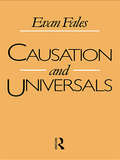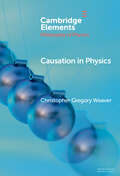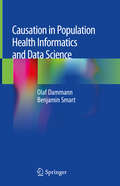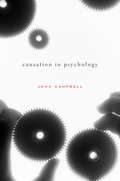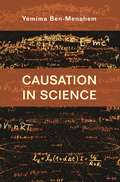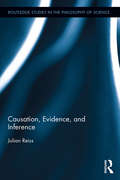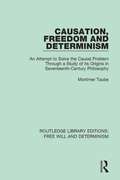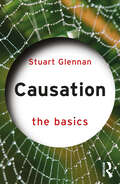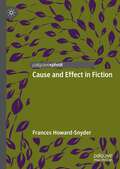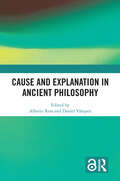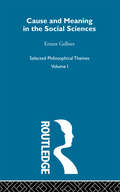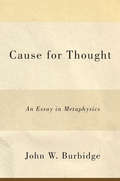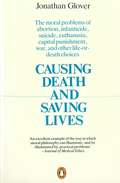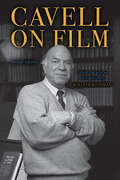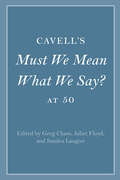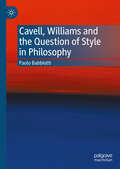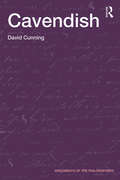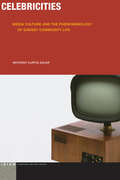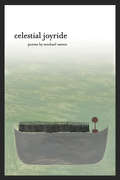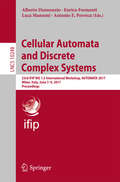- Table View
- List View
Causation and Laws of Nature (Routledge Studies in Contemporary Philosophy #Vol. 2)
by Max KistlerThis is the first English translation of Causalite´ et Lois de La Nature, and is an important contribution to the theory of causation. Max Kistler reconstructs a unified concept of causation that is general enough to adequately deal with both elementary physical processes, and the macroscopic level of phenomena we encounter in everyday life. This book will be of great interest to philosophers of science and metaphysics, and also to students and scholars of philosophy of mind where concepts of causation and law play a prominent role.
Causation and Modern Philosophy (Routledge Advances in the History of Philosophy)
by Tom Stoneham Keith AllenThis volume brings together a collection of new essays by leading scholars on the subject of causation in the early modern period, from Descartes to Lady Mary Shepherd. Aimed at researchers, graduate students and advanced undergraduates, the volume advances the understanding of early modern discussions of causation, and situates these discussions in the wider context of early modern philosophy and science. Specifically, the volume contains essays on key early modern thinkers, such as Descartes, Hobbes, Spinoza, Leibniz, Hume, Kant. It also contains essays that examine the important contributions to the causation debate of less widely discussed figures, including Louis la Forge, Thomas Brown and Lady Mary Shepherd.
Causation and Universals
by Evan FalesThe world contains objective causal relations and universals, both of which are intimately connected. If these claims are true, they must have far-reaching consequences, breathing new life into the theory of empirical knowledge and reinforcing epistemological realism. Without causes and universals, Professor Fales argues, realism is defeated, and idealism or scepticism wins. Fales begins with a detailed analysis of David Hume's argument that we have no direct experience of necessary connections between events, concluding that Hume was mistaken on this fundamental point. Then, adopting the view of Armstrong and others that causation is grounded in a second-order relation between universals, he explores a range of topics for which the resulting analysis of causation has systematic implications. In particular, causal identity conditions for physical universals are proposed, which generate a new argument for Platonism. The nature of space and time is discussed, with arguments against backward causation and for the view that space and time can exist independently of matter or causal process. Many of Professor Fales's conclusions seem to run counter to received opinion among contemporary empiricists. Yet his method is classically empiricist in spirit, and a chief motive for these metaphysical explorations is epistemological. The final chapters investigate the perennial question of whether an empiricist, internalist and foundational epistemology can support scientific realism.
Causation in Physics (Elements in the Philosophy of Physics)
by Christopher Gregory WeaverCausation in Physics demonstrates the importance of causation in the physical world. It details why causal mastery of natural phenomena is an important part of the effective strategies of experimental physicists. It develops three novel arguments for the viewpoint that causation is indispensable to the ontology of some of our best physical theories. All three arguments make much of the successes of experimental physics. This title is also available as Open Access on Cambridge Core.
Causation in Population Health Informatics and Data Science
by Olaf Dammann Benjamin SmartMarketing text: This book covers the overlap between informatics, computer science, philosophy of causation, and causal inference in epidemiology and population health research. Key concepts covered include how data are generated and interpreted, and how and why concepts in health informatics and the philosophy of science should be integrated in a systems-thinking approach. Furthermore, a formal epistemology for the health sciences and public health is suggested. Causation in Population Health Informatics and Data Science provides a detailed guide of the latest thinking on causal inference in population health informatics. It is therefore a critical resource for all informaticians and epidemiologists interested in the potential benefits of utilising a systems-based approach to causal inference in health informatics.
Causation in Psychology
by John CampbellA renowned philosopher argues that singular causation in the mind is not grounded in general patterns of causation, a claim on behalf of human distinctiveness, which has implications for the future of social robots.A blab droid is a robot with a body shaped like a pizza box, a pair of treads, and a smiley face. Guided by an onboard video camera, it roams hotel lobbies and conference centers, asking questions in the voice of a seven-year-old. “Can you help me?” “What is the worst thing you’ve ever done?” “Who in the world do you love most?” People pour their hearts out in response.This droid prompts the question of what we can hope from social robots. Might they provide humanlike friendship? Philosopher John Campbell doesn’t think so. He argues that, while a social robot can remember the details of a person’s history better than some spouses can, it cannot empathize with the human mind, because it lacks the faculty for thinking in terms of singular causation.Causation in Psychology makes the case that singular causation is essential and unique to the human species. From the point of view of practical action, knowledge of what generally causes what is often all one needs. But humans are capable of more. We have a capacity to imagine singular causation. Unlike robots and nonhuman animals, we don’t have to rely on axioms about pain to know how ongoing suffering is affecting someone’s ability to make decisions, for example, and this knowledge is not a derivative of general rules. The capacity to imagine singular causation, Campbell contends, is a core element of human freedom and of the ability to empathize with human thoughts and feelings.
Causation in Science
by Yemima Ben-MenahemThis book explores the role of causal constraints in science, shifting our attention from causal relations between individual events--the focus of most philosophical treatments of causation—to a broad family of concepts and principles generating constraints on possible change. Yemima Ben-Menahem looks at determinism, locality, stability, symmetry principles, conservation laws, and the principle of least action—causal constraints that serve to distinguish events and processes that our best scientific theories mandate or allow from those they rule out.Ben-Menahem's approach reveals that causation is just as relevant to explaining why certain events fail to occur as it is to explaining events that do occur. She investigates the conceptual differences between, and interrelations of, members of the causal family, thereby clarifying problems at the heart of the philosophy of science. Ben-Menahem argues that the distinction between determinism and stability is pertinent to the philosophy of history and the foundations of statistical mechanics, and that the interplay of determinism and locality is crucial for understanding quantum mechanics. Providing historical perspective, she traces the causal constraints of contemporary science to traditional intuitions about causation, and demonstrates how the teleological appearance of some constraints is explained away in current scientific theories such as quantum mechanics.Causation in Science represents a bold challenge to both causal eliminativism and causal reductionism—the notions that causation has no place in science and that higher-level causal claims are reducible to the causal claims of fundamental physics.
Causation, Evidence, and Inference (Routledge Studies in the Philosophy of Science)
by Julian ReissIn this book, Reiss argues in favor of a tight fit between evidence, concept and purpose in our causal investigations in the sciences. There is no doubt that the sciences employ a vast array of techniques to address causal questions such as controlled experiments, randomized trials, statistical and econometric tools, causal modeling and thought experiments. But how do these different methods relate to each other and to the causal inquiry at hand? Reiss argues that there is no "gold standard" in settling causal issues against which other methods can be measured. Rather, the various methods of inference tend to be good only relative to certain interpretations of the word "cause", and each interpretation, in turn, helps to address some salient purpose (prediction, explanation or policy analysis) but not others. The main objective of this book is to explore the metaphysical and methodological consequences of this view in the context of numerous cases studies from the natural and social sciences.
Causation, Freedom and Determinism: An Attempt to Solve the Causal Problem Through a Study of its Origins in Seventeenth-Century Philosophy (Routledge Library Editions: Free Will and Determinism #1)
by Mortimer TaubeThis book, first published in 1936, divides into roughly two parts: a re-examination of historical material; and a positive theory of causation suggested by the results of this re-examination. The historical study discloses an ambiguity in the meanings of causation and determinism; it discloses also that this ambiguity is transferred to the meaning of freedom.
Causation: The Basics (The Basics)
by Stuart GlennanCausation: The Basics explores questions about what causes are, and how we come to know them, describe them, and put them to use. The book begins with an introduction to the history of philosophical thinking about causation, followed by a series of chapters introducing important contemporary accounts of causation. It concludes with chapters on causation and agency, causal discovery, and causal explanation. Key questions explored in the book include: What distinguishes correlation from causation? How are the causes of singular events related to more general patterns of cause and effect? How are commonsense, scientific, and legal conceptions of causation related? Can certain occurrences be singled out as the main or principle causes of some effect? Is there a place in the world’s causal structure for human agency and free will? While introducing the major philosophical debates about the nature of causation, Causation: The Basics emphasizes the uses and challenges of causal reasoning as it occurs in the sciences, engineering, medicine, and other areas of human life. With a glossary of key terms and suggestions for further reading, the book provides readers with a clear and concise introduction to both theoretical and practical questions about causation.
Cause and Chance: Causation in an Indeterministic World (International Library of Philosophy)
by Phil Dowe Paul NoordhofPhilosophers have long been fascinated by the connection between cause and effect: are 'causes' things we can experience, or are they concepts provided by our minds? The study of causation goes back to Aristotle, but resurged with David Hume and Immanuel Kant, and is now one of the most important topics in metaphysics. Most of the recent work done in this area has attempted to place causation in a deterministic, scientific, worldview. But what about the unpredictable and chancey world we actually live in: can one theory of causation cover all instances of cause and effect? Cause and Chance: Causation in an Indeterministic World is a collection of specially written papers by world-class metaphysicians. Its focus is the problem facing the 'reductionist' approach to causation: the attempt to cover all types of causation, deterministic and indeterministic, with one basic theory. Contributors: Stephen Barker, Helen Beebee, Phil Dowe, Dorothy Edgington, Doug Ehring, Chris Hitchcock, Igal Kwart, Paul Noordhof, Murali Ramachandran and Michael Tooley.
Cause and Effect in Fiction
by Frances Howard-SnyderThis book explores and defends George Saunders’ causal thesis that successful stories are those that establish causation well. The book includes an in-depth discussion of causation’s role in several different key craft elements of fiction writing and examines different theories of causation and their implications for causation in fiction. Other discussions include the role of causation in building suspense, character and causation, causation in dialogue and connections between fiction and counterfactuals (or hypotheticals). The book also considers a number of objections to the causal thesis and offers a reply.
Cause and Explanation in Ancient Philosophy
by Daniel Vázquez Alberto RossThis volume offers an updated analysis of the use, meaning, and scope of the classical notion of aitia. It clarifies philosophical and philological questions about aitia and offers bold and innovative interpretations of this key concept of ancient philosophy. The numerous meanings and nuances of aitia remain difficult to grasp. Ancient philosophers use aitia to explain the existence and activity of substances, bodies, souls, or gods. Paradoxically, its own definition remains difficult to establish. This book reconstructs some of the most important uses, variants, and scopes of the term aitia within different philosophical perspectives in antiquity, including early Greek philosophy, Plato, Aristotle, Stoicism, and Islamic philosophy. The chapters analyze metaphysical aspects, epistemological issues, and logical implications of aitia. They engage with the most relevant critical literature generated in several modern languages. In doing so, they offer an inclusive and overarching re-evaluation of our assumptions about causation and explanation in ancient philosophy. Cause and Explanation in Ancient Philosophy will be of interest to scholars and advanced students working on Pre-Socratic philosophy, Plato, Aristotle, Hellenistic philosophy, late antiquity, and medieval philosophy.
Cause and Explanation in Ancient Philosophy
by Daniel Vázquez Alberto RossThis volume offers an updated analysis of the use, meaning, and scope of the classical notion of aitia. It clarifies philosophical and philological questions about aitia and offers bold and innovative interpretations of this key concept of ancient philosophy.The numerous meanings and nuances of aitia remain difficult to grasp. Ancient philosophers use aitia to explain the existence and activity of substances, bodies, souls, or gods. Paradoxically, its own definition remains difficult to establish. This book reconstructs some of the most important uses, variants, and scopes of the term aitia within different philosophical perspectives in antiquity, including early Greek philosophy, Plato, Aristotle, Stoicism, and Islamic philosophy. The chapters analyze metaphysical aspects, epistemological issues, and logical implications of aitia. They engage with the most relevant critical literature generated in several modern languages. In doing so, they offer an inclusive and overarching re-evaluation of our assumptions about causation and explanation in ancient philosophy.Cause and Explanation in Ancient Philosophy will be of interest to scholars and advanced students working on Pre-Socratic philosophy, Plato, Aristotle, Hellenistic philosophy, late antiquity, and medieval philosophy.The Open Access version of this book, available at www.taylorfrancis.com, has been made available under a Creative Commons Attribution-NonCommercial-NoDerivatives (CC-BY-NC-ND) 4.0 International license.
Cause and Meaning in the Social Sciences (Routledge Library Editions Ser.)
by Ernest GellnerThis volume focuses on key conceptual issues in the social sciences, such as Winch's idea of a social science, structuralism, Malinowski and Evans-Pritchard, and the concept of kinship. In particular it deals with such problems as the relationship of nature and culture, the relevance of concepts drawn from within a given society to its understanding, and the relation of theory to time.
Cause for Thought
by John W. BurbidgeDoes the fact that everything has a cause imply that all events are causally determined? Drawing on discussions from the history of philosophy, John Burbidge's Cause for Thought captures the diverse dynamics found in physics, chemistry, biology, animal psychology, and rational action. At each level, forms of activity emerge that cannot be reduced to the functioning of simpler, more elementary components. By exploring the logic of what happens when two causal conditions reciprocally interact, Burbidge develops a concept of complex cause in which an agent generates effects not simply because of the action of its constituent components, but also because of the way those components mutually supplement and reinforce one another. By extending this to the interaction of agents with their environment, Burbidge throws light on the structure of organisms, on the distinctive contributions of consciousness and rationality, and on the quest for a comprehensive explanation of the cosmos. Recovering the force and legitimacy of metaphysical inquiry by focusing on the concept of cause and causality, Cause for Thought offers a new way of understanding natural processes, the role of consciousness and free will, and the significance of rational explanation.
Causing Death and Saving Lives: The Moral Problems of Abortion, Infanticide, Suicide, Euthanasia, Capital Punishment, War and Other Life-or-death Choices
by Jonathan GloverThe moral problems of abortion, infanticide, suicide, euthanasia, capital punshiment, war and othe life-or-death choices.
Cavell on Film (SUNY series, Horizons of Cinema)
by Stanley CavellA collection of the philosopher Stanley Cavell's most important writings on cinema.Stanley Cavell was the first philosopher in the Anglo-American tradition to make film a central concern of his work, and this volume offer a substantially complete retrospective of his writings on cinema, which continues to offer inspiration and new directions to the field of film and media studies. The essays and other writings collected here include major theoretical statements and extended critical studies of individual films and filmmakers, as well as occasional pieces, all of which illustrate Cavell's practice of film-philosophy as it developed in the decades following the publication of his landmark work, The World Viewed. This revised edition includes six additional essays, five of them previously unpublished, that illuminate his inspiring vision of a humanistic study rooted in a marriage of film and philosophy. In his introduction and in the preface to this new edition, William Rothman provides an overview of Cavell's work on film and his aims as a philosopher more generally.
Cavell's Must We Mean What We Say? at 50 (Cambridge Philosophical Anniversaries)
by Sandra Laugier Juliet Floyd Greg ChaseIn 1969 Stanley Cavell's Must We Mean What We Say? revolutionized philosophy of ordinary language, aesthetics, ethics, tragedy, literature, music, art criticism, and modernism. This volume of new essays offers a multi-faceted exploration of Cavell's first and most important book, fifty years after its publication. The key subjects which animate Cavell's book are explored in detail: ordinary language, aesthetics, modernism, skepticism, forms of life, philosophy and literature, tragedy and the self, the questions of voice and audience, jazz and sound, Wittgenstein, Austin, Beckett, Kierkegaard, Shakespeare. The essays make Cavell's complex style and sometimes difficult thought accessible to a new generation of students and scholars. They offer a way into Cavell's unique philosophical voice, conveying its seminal importance as an intellectual intervention in American thought and culture, and showing how its philosophical radicality remains of lasting significance for contemporary philosophy, American philosophy, literary studies, and cultural studies.
Cavell, Williams and the Question of Style in Philosophy
by Paolo BabbiottiThis book considers the work of two philosophers situated within the anglo-american analytical tradition, Stanley Cavell (1926-2018) and Bernard Williams (1929-2003). It examines the literary strategies that these stylistically-aware authors employ and also the ethical demand which guides their philosophies and gives substance to their philosophical styles. The book thereby aims to demonstrate the importance of style in philosophy and suggest some of the intellectual dynamics a philosopher’s conscious awareness of style can create.
Cavendish (Arguments of the Philosophers)
by David CunningMargaret Cavendish (1623 - 1673) was a philosopher, poet, scientist, novelist, and playwright of the seventeenth century. Her work is important for a number of reasons. It presents an early and compelling version of the naturalism that is found in current-day philosophy; it offers important insights that bear on recent discussions of the nature and characteristics of intelligence and the question of whether or not the bodies that surround us are intelligent or have an intelligent cause; it anticipates some of the central views and arguments that are more commonly associated with figures like Thomas Hobbes and David Hume. This is the first full account of Cavendish’s philosophy and covers the whole span of her work. David Cunning begins with an overview of Cavendish’s life and work before assessing her contribution to a wide range of philosophical subjects, including her arguments concerning materialism, experimentation, the existence of God, social and political philosophy and free will and compatibilism. Setting Cavendish in both historical and philosophical context, he argues that like Spinoza she builds on central tenets of Descartes’ philosophy and develops them in a direction that Descartes himself would avoid. She defends a plenum metaphysics according to which all individuals are causally interdependent, and according to which the physical universe is a larger individual that constitutes all of reality. Cavendish is essential reading for students of seventeenth-century philosophy, early modern philosophy and seventeenth-century literature.
Cavendish (The Routledge Philosophers)
by Alison PetermanDazzlingly original but deeply engaged with the philosophical currents of her time, Margaret Cavendish (1623–1673) was one of the most ingenious and exciting philosophers of the seventeenth century. In Cavendish, Alison Peterman provides a systematic reading of Cavendish’s natural philosophy. While highlighting interpretations of Cavendish that present her as an anthropomorphic thinker, Peterman advocates instead for reading Cavendish in light of her naturalism, materialism, and anti-anthropocentrism, explaining how these themes ramify in Cavendish’s metaphysics, philosophy of mind, epistemology, and method. Cavendish articulates and explains what is novel and heterodox in Cavendish’s views, and also examines her philosophical engagement with other seventeenth-century thinkers like Hobbes, Boyle, Descartes, and Hooke.An outstanding introduction for newcomers to Cavendish, Cavendish is essential reading for students and scholars of Cavendish as well as those taking courses in seventeenth-century philosophy, metaphysics, history of science, philosophy of mind, epistemology, and philosophical methodology.
Celebricities: Media Culture and the Phenomenology of Gadget Commodity Life (Idiom: Inventing Writing Theory)
by Anthony Curtis AdlerWhat becomes of life, experience, and truth in the hyperconsumeristic culture of the twenty-first century? What happens to the phenomenological call to go “back to the things themselves” when these things, to an ever greater degree, involve a televised life that is not ours to live, celebrities who are utterly like us yet infinitely untouchable, and uncannily pluripotent electronic gadgets? Combining sustained philosophical inquiry with fragmentary and experimental theoretical interventions, Anthony Curtis Adler rethinks Marxist materialism and the Heideggerian project in terms of the singular experiences of late capitalism. In doing so, he reveals how the disarticulation of life via the commodity fetish demands at once a new notion of phenomenological method and an ontology oriented toward the radical contingency of being itself as transcendental ground.
Celestial Joyride
by Michael WatersIn these poems of taut clarity, craft, and texture, Michael Waters continues his bold exploration of sensual pleasure and moral transgression as means of affirming spiritual faith. Just as a joyride suggests recklessness and exhilaration, so Celestial Joyride is an energized journey marked by spiritual recklessness in the face of perpetual mortality. Compelling, musical narratives offer rich meaning and vivid consequence.Michael Waters's poetry books include BOA Editions titles Gospel Night, Darling Vulgarity, finalist for the Los Angeles Times Book Prize; and Parthenopi, finalist for the Paterson Poetry Prize. He teaches at Monmouth University and in the Drew University MFA Program.
Cellular Automata and Discrete Complex Systems: 23rd IFIP WG 1.5 International Workshop, AUTOMATA 2017, Milan, Italy, June 7-9, 2017, Proceedings (Lecture Notes in Computer Science #10248)
by Enrico Formenti Alberto Dennunzio Luca Manzoni Antonio E. PorrecaThis volume constitutes the thoroughly refereed proceedings of the 23rd IFIP WG 1. 5 International Workshop on Cellular Automata and Discrete Complex Systems, AUTOMATA 2017, held in Milan, Italy, in June 2017. The 14 full papers presented together with one full-length invited paper and 2 invited talk abstracts were carefully reviewed and selected from a total of 28 submissions. The papers feature research on correlated models of automata. The topics include aspects and features of such models: dynamics; topological, ergodic, and algebraic aspects; algorithmic and complexity issues; emergent properties; formal languages; symbolic dynamics; tilings; models of parallelism and distributed systems; timing schemes; synchronous versus asynchronous models; phenomenological descriptions; scientific modelling; practical applications.
